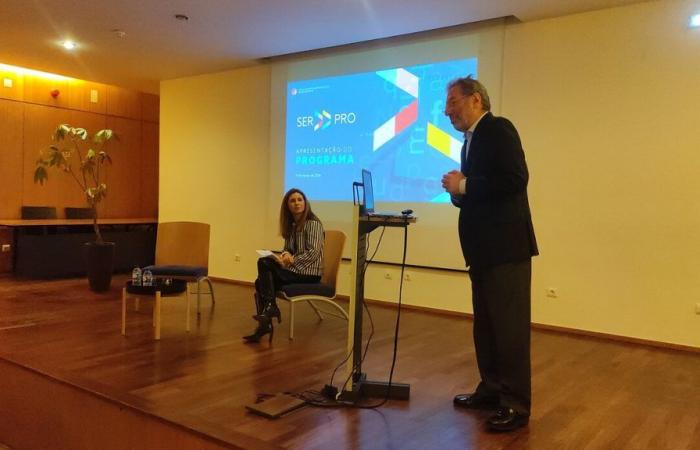The reading difficulty rate above 20% and the stigma that society still has towards professional schools were the motto for a conversation with Nuno Crato, former Minister of Education and Science of Portugal, who, yesterday afternoon, was at the Vasconcellos Lebre Professional School, in Mealhada, as part of the “Bet on the Future” initiative, carried out by the school last week. Entitled «Professional education within the framework of the educational system: Citizenship of the proposal, for full citizenship of its recipients/protagonists», the conversation was moderated by journalist Margarida Alvarinhas.
«From 2012 to 2015, compulsory education rose from the 9th to the 12th year, with vocational education having almost 40% of young people and was already at 43%, which proves to be a very important part of compulsory education . Professional education provides certification of education, provides professional qualifications for job search and also allows students to continue studies”, praised Nuno Crato, explaining that “fortunately in Portugal, professional education begins in the 3rd Cycle”, which provides ” an identical education for everyone up to the 9th year”.
The former Minister of Education and Science of Portugal said that “it is normal for a 15-year-old to not know what he wants to do and to have uncertainty about the future”, admitting, however, that he is not “knowing how to explain to young people the options that has. At the age of 15, they should have a clear idea of the offers available and what they contain” and giving as an example “the cases of Germany and Switzerland, where vocational education is highly valued”.
An appreciation that some people in the audience assured did not exist and was not recognized. «The feeling is that there is shame in assuming professional education», said one of the speakers, corroborated by an EPVL teacher who revealed that two weeks ago she presented the vocational education figures, «in an attempt to deconstruct the idea that They told me that they were here because it was easier to complete their studies than in regular education».
«We parents should also have more information, as we have an obligation to open up the range of offers to them. We know them well and can make them more aware of what they want from the future», said an education officer, present at the event. An idea shared by the student, Cristina Pinto, 17 years old, a student in the 12th year of the Educational Action course, who recalled that in the 9th year she already knew that she intended to pursue professional education. «At that time, regular education only introduced me to the continuation of regular education and did not help me in the commitment I wanted to pursue professional education. Also at home, when I said what I wanted, it was a “31”, sometimes because the teaching wasn’t good, sometimes because there were only people with addictions, but I didn’t give up and here I am finishing the course”, said the young woman, who intends to pursue higher education in the field of Psychology.
Carlos Sousa, director of EPVL, said that «the dropout rate in the last academic year was 2%» and that, currently, «around 20 students who enrolled in various courses, after three months, decided that It wasn’t what they wanted.” “Is the country working in the vocational area of our young people?”, he asked rhetorically.
“More than 20% of young people have reading difficulties”
Nuno Crato presented the Teresa and Alexandre Soares dos Santos Education Initiative, where he is one of the directors, and which, among other proposals, supports children in the 1st and 2nd years with difficulties in initially learning to read and write. «The percentage of young people with great reading difficulties is above 20% and, therefore, the central program has to be addressed right from the beginning», he said, adding that it is «a Western problem. There are countries in Southwest Asia where this rate is 4% and this is inevitable, due to several conditions. 20% is not excusable, but in Western countries it began to be accepted that it was normal for students not to know how to read».
Monica Sofia Lopes
Tags: Nuno Crato points reasons choosing professional education Audience talks stigma
--





